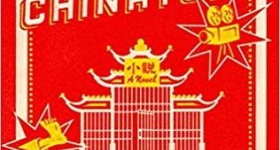Steven J. Kung’s A Leading Man (2013) has won the Best Feature award at the 2014 DisOrient
Asian American Film Festival; a Special Jury Award in Best Cinematography from
the Los Angeles Asian Pacific Film Festival; and awards for Best Drama - Feature Film, Best
Actor (Jack Yang), and Best Supporting Actor (Raymond Lee) at the 2014 Asians
on Film Festival. It will screen at the Dances with Film
Festival in Los Angeles on June 4th. Hyphen's Timothy Tau recently spoke with Steven Kung about the film, which explores challenges faced by Asian actors and the stereotypes they are often cast to embody.
TT: What
initially inspired you to write and make A Leading Man?
Steven J. Kung: The overtly racist backlash against Jeremy
Lin, the appallingly offensive stereotypes of the NBC show Outsourced, and a
SAG-AFTRA report that concluded that Asian Americans are an underserved source
of revenue for the entertainment industry. It became clear that Asian Americans
suffered from media inequality, and the worst part of it was that people
weren’t aware of it -- and if they were, they didn’t care. I wanted to make them
care.
Did you do any research on Asian American
actors for this film?
GQ Chi [played by Jack Yang]’s background is
based on an Asian actor friend of mine. He had
extensive experience and training in acting…and, like GQ, he landed a major
role on Broadway (the revival of Flower
Drum Song). Despite all his accomplishments and talent, he has trouble
finding steady work. It’s not only unfair to him, it’s emblematic of how Asian
actors are treated in general.
Each role seems to be played by the
perfect actor. How were they cast?
I wanted to cast unknowns to introduce a new
generation of Asian American performers -- the exception to this is casting
living legend Tsai Chin. I doubled Grandma Mei-An’s lines after she came on
board. As for casting GQ’s mother, I wrote the character with my own mother’s
voice in mind, so when it came time to cast the part, I thought “Why not?” Jack
was actually the last piece to fall into place; we met over lunch and talked
about GQ and his struggles. When Jack told me that he had publicly called
bullshit at an industry diversity panel the same way GQ did in the movie, I
knew I had my GQ.
You
have a lot of experience in the entertainment industry working on shows such as
Mad Men. How did this influence A Leading Man?
Assistant gigs give you enormous access to the
creative process of movies and films. On Mad
Men, I saw every iteration of the story outlines, and it was interesting to
see how they evolved and why. When you work on a show and have a mentor like
Matt Weiner, you can’t help but absorb a lot, and I see that in some of the
characters and plots in A Leading Man.
Can you describe the landscape of Asian American cinema right now?
I think Asian American film is in a golden age
because technology has allowed more unique voices to tell their stories. Technology
has also given rise to a unique Asian American culture, [including] bloggers,
web shorts, and foodies, that I didn’t have growing up. I’m glad we as Asian
Americans are making a space for ourselves in new media, but we shouldn’t
forget traditional film and television. And if we’re not invited, we need to
either gussy ourselves up to get invited or crash it. We can’t forget that
the creative content we make acts as an ambassador for our community, promoting
cross-cultural understanding and forging relationships. It’s good that our
community watches and supports our art, but the key is to get people outside of
our community to support it as well. That’s why for me, it’s been very
important to get A Leading Man into,
for lack of a better word, “white festivals.” We can’t be complacent about
preaching to the choir; we have to reach out to our neighbors and most
importantly, to the people in charge who make the big decisions.
What's next for you?
A
Leading Man is screening at Dances with Films in Los Angeles and then the Asian Film Festival of
Dallas. We’re still figuring out our theatrical and home video distribution
plan. There are several projects on the front burner, all very different from A Leading Man: a Mandarin-language
romantic comedy about wine-tasting; an Indiana Jones-esque action movie about a
luxurious hotel; a historical biopic about Jesus freak Lonnie Frisbee, a man
who created modern worship culture in the evangelical Christian Church only to
die of AIDS in 1993, ostracized by the churches he founded because of his
sexuality.
***
You can see A Leading Man at
the 2014 Dances with Film Festival on
Wednesday, June 4th at 2:45pm. Tickets can be
purchased here.










Comments